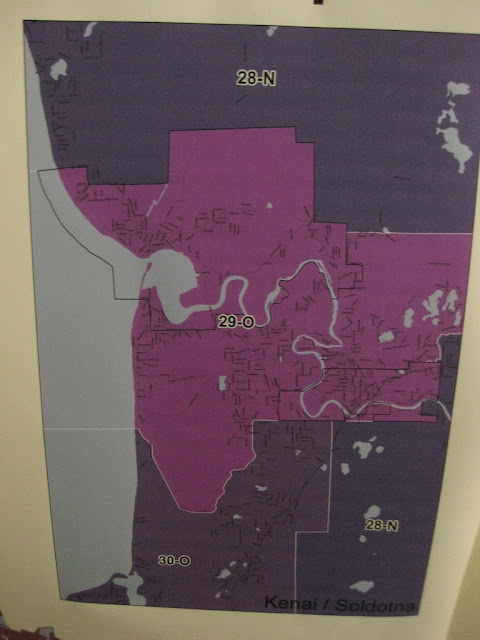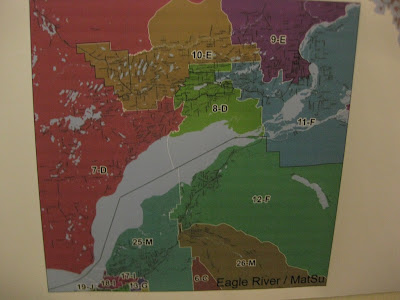Most of the Alaska Redistricting Board is hoping that the US Supreme Court will overturn Section 5 of the federal Voting Rights Act when the decision on Shelby County v Holder comes out soon. (Though one member told me it was disappointing to see that the State of Alaska filed an amicus brief for Shelby County.)
I've written about this case already here.
But I wanted to point out that getting rid of Section 5 likely, at least in the short run, give Republicans a boost in elections by making it easier to set up obstacles to voting by Blacks and other protected classes.
The conservatives - particularly Scalia,
Roberts, and Kennedy - seemed to be suggesting the standards used to determine which states were required to get pre-clearance for redistricting plans and other voting regulations is outdated. The
problem is over now, they say, and the states shouldn't be singled out above all the
other states for special treatment.
This is despite a
report to Congress [I think the link is to
the Report], but there's a small chance it's another report] showing that serious problems still exist, and Congress passing the renewal of the VRA overwhelmingly - 98-0
in the Senate. 390 - 33* in the House.
Listening to the oral arguments, I couldn't help but think that these
are the same Justices who voted to cut off the Florida voting review
process and declare George W. Bush president in 2000. And I couldn't
help but think of this
quote I saw on Immoral Minority (from Huffington Post) from a Texas Tea Party leader the other day:
“I’m going to be real honest with you,” Emanuelson said. “The
Republican Party doesn’t want black people to vote if they are going to
vote 9-to-1 for Democrats.”
I'm sure that is true. Why would they want Blacks to vote if they're going to vote for Democrats? But voter suppression is what's supposed to happen in phony elections in dictatorships, not the USA. But
voter suppression was one of the tactics Republicans used in the last several elections - though their spin was to fight "voter fraud" which no one could find.
As the decision in this case is imminent and it will affect redistricting in Alaska, I do want to point out a couple of points that came up
in the oral arguments.
Scalia and "Racial Entitlement":
"And this last enactment [the 2006 renewal of the Voting Rights Act], not a single vote in the Senate against it. And the House is pretty much the same. Now, I don't think that's attributable to the fact that it is so much clearer now that we need this. I think it is attributable, very likely attributable, to a phenomenon that is called perpetuation of racial entitlement. It's been written about. Whenever a society adopts racial entitlements, it is very difficult to get out of them through the normal political processes." (p. 47 of the Oral Arguments transcript)
OK, entitlement is a bad word for Republicans. It means, for them, you get something you don't deserve. So, whatever "Racial Entitlement" is supposed to mean, the intent would seem to be getting something you don't deserve because of your race.
Prof. Peggy Macintosh wrote persuasively about White Privilege in 1988, but I don't think that's what they mean here.
"It's been written about" caught my eye and so I googled 'racial entitlement' and found that others noticed that term when it was uttered back in February. Rachel Maddow's research staff found that it was indeed written about, in a
paper in 1979, written by one Antonin Scalia, called "Racial Entitlement: 'In Order To Get Beyond Racism We Must First Account of Race.'" I know it's ironic, paradoxical even, that we have to take into consideration the idea of race to fight racism, but yeah, we do. After hundreds of years of race being used to discriminate against people you can't make it all go away by saying today everyone is equal. But that seems to be a lot of Scalia;s thinking on this.
Apparently here he means that the 98-0 vote in the Senate means the members have no choice but to vote for it. He uses this logic for why the Court should overrule this overwhelming vote for renewing the Voting Rights Act in 2006 (which President GW Bush was strongly supporting.)
"I don't think there is anything to be gained by any Senator to vote against continuation of this act. And I am fairly confident it will be reenacted in perpetuity unless -- unless a court can say it does not comport with the Constitution."
So, the Senators are spineless and afraid to vote against it because their constituents their constituents want it. Therefore the Supreme Court needs to step in. I don't hear him arguing that Senators afraid to vote for gun control, and therefore the Supreme Court needs to help out.
And, in fact, 33* members of Congress were not afraid to vote against the VRA.
Voter Turnout Shows Mississippi is Fine But Massachusetts Isn't
The logic of the Chief Justice:
CHIEF JUSTICE ROBERTS: Just to get the -- do you know which State has the worst ratio of white voter turnout to African American voter turnout?
GENERAL VERRILLI: I do not.
CHIEF JUSTICE ROBERTS: Massachusetts. Do you know what has the best, where African American turnout actually exceeds white turnout? Mississippi.
Part of the formula in the law, for determining which states must get pre-clearance from the Department of Justice (DOJ) is percent of voter turnout. But I would argue that his conclusion, today, that Mississippi's black turnout his higher than Massachusetts', is wrong. It doesn't indicate the problem is over. I would argue it indicates the opposite.
The formula that the Justice
Department uses in calculating, in Alaska's
case, "Native Districts" includes factors such as whether the
non-Native population votes the same way the Native population votes.
If yes, then the percentage of Natives in the district can be lower to
meet the standards.
And that's why you might see lower African American
turnout in Massachusetts. African American voters know their votes are
not as important because the white voters vote the same way they do.
African Americans feel their rights are protected and have less concern
about voting. They know the party that will protect their rights will
be elected if they vote or not.
In Mississippi, if African Americans don't vote, they know the White voters will vote against their interests.
This could be a lot longer because there is plenty to raise one's eyebrows in this case. For instance, Justice Kennedy brought up the term "reverse engineering" to explain why ther VRA standards are a bogus way to give an after the fact rationale for picking the states they wanted to pick. (Others argue that those standards are still a good proxy for the states that need to be watched most closely and the number of lawsuits correlates with that reasoning.) But I just don't have time for more.
This should at least get some people aware of the thinking of the Justices who are likely to vote in favor of Shelby County.
Undoubtedly, removing the checks on states and localities who have traditionally discriminated against Blacks and other ethnic groups, is likely to increase the number of disenfranchised voters. After the fact remedies don't unelect people who got elected by voter suppression.
I would note, that
some argue that the Voting Rights Act actually helps Republicans by packing all the left leaning protected classes into a few very heavily Black (or in our case Native) districts, thus getting Democratic voters out of other districts. There may be merit to that argument (some Black representatives win 90% of the vote), but just getting rid of Section 5 (that requires pre-clearance of changes) seems to do more harm to Black (and Native) voters than good. I need more time to think this through.
*
House members voting against renewal in 2006.
| State |
# of No
Votes |
Congress Members Voting No |
| Alabama |
2 |
Jo Bonner (R-AL)
Terry Everett (R-AL) |
| Arizona |
2 |
Trent Franks (R-AZ)
John Shadegg (R-AZ) |
| California |
6 |
John
Campbell (R-CA)
John Doolittle
(R-CA)
Wally Herger (R-CA)
Gary Miller (R-CA)
Dana Rohrabacher (R-CA)
Ed Royce (R-CA) |
| Colorado |
2 |
Joel
Hefley (R-CO)
Thomas Tancredo (R-CO) |
| Georgia |
6 |
Nathan Deal (R-GA)
Phil Gingrey (R-GA)
John Linder (R-GA)
Charles Norwood (R-GA)
Tom Price
(R-GA)
Lynn Westmoreland
(R-GA) |
| Iowa |
1 |
Steve King (R-IA) |
| Indiana |
1 |
Dan Burton (R-IN) |
| Louisiana |
1 |
Richard Baker (R-LA) |
| Maryland |
1 |
Roscoe Bartlett
(R-MD) |
| North Carolina |
2 |
Virginia Foxx (R-NC)
Patrick McHenry (R-NC) |
| New Jersey |
1 |
Scott Garrett (R-NJ) |
| South Carolina |
1 |
J. Gresham Barrett (R-SC) |
| Tennessee |
1 |
John Duncan (R-TN) |
| Texas |
6 |
Joe Barton (R-TX)
Mike Conaway (R-TX)
Jeb Hensarling (R-TX)
Sam Johnson
(R-TX)
Ron Paul (R-TX)
William Thornberry (R-TX) |
Lavender indicates former member of Congress.















.jpg)
















